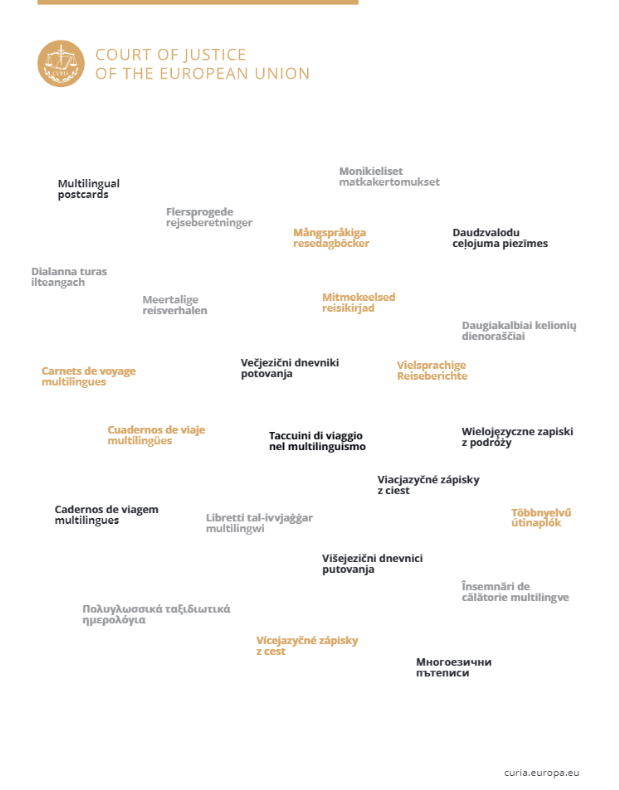
Resumen:El multilingüismo, en principio y en función, ha sido codificado en diversos instrumentos jurídicos, en particular por el primer reglamento adoptado por la CEE, el Reglamento 1/58, que sigue vigente hoy en día. Sin embargo, al igual que la democracia, su preservación depende de un esfuerzo constante por explicarlo en el contexto de una perspectiva a largo plazo. El multilingüismo se pone regularmente en tela de juicio con el pretexto de la rapidez y la economía, como si fuera más una limitación que un aspecto de nuestra riqueza compartida. En el Tribunal de Justicia de la Unión Europea, el multilingüismo adquiere una importancia particular, ya que determina, en un primer momento, el desarrollo de los procedimientos y, en una fase posterior, garantiza que la jurisprudencia sea accesible a todos en su propia lengua. Sin embargo, las legítimas exigencias de eficacia y control de costes siguen siendo cruciales, por lo que la reflexión es constante y se aprovechan al máximo las últimas tecnologías para ofrecer siempre al ciudadano un servicio óptimo. Este libro expone los factores históricos, jurídicos y políticos que han propiciado la aparición de un fuerte multilingüismo institucional como instrumento de igualdad, inclusión y progreso. Describe el régimen lingüístico de la institución y el modo en que se practica en ella el multilingüismo, en particular por parte de los servicios de interpretación y traducción jurídica.
Summary:Multilingualism, in principle and in function, has been codified in various legal instruments, in particular by the first regulation adopted by the EEC, Regulation 1/58, which remains in force today. However, like democracy, its preservation depends on a constant endeavour to explain it within the context of a long-term perspective. Multilingualism is regularly called into question on the pretext of speed and economy, as though it were more of a constraint than an aspect our shared wealth. At the Court of Justice of the European Union, multilingualism takes on a particular importance, as it determines, at the outset, how the procedures are conducted and, at a later stage, ensures that the case-law is accessible to everyone in their own language. However, legitimate requirements of efficiency and cost control remain crucial, with the result that there is constant reflection and the latest technologies are used to the fullest in order always to provide the citizen with an optimal service. This book sets out the historical, legal and political factors that have led to the emergence of strong institutional multilingualism as an instrument of equality, inclusion and progress. It describes the language regime of the institution and the manner in which multilingualism is practised there, in particular by the interpretation and legal translation services. It reflects on the points of view and arguments that are regularly raised in the press and in academic legal writing, and it proposes, on the basis of objective analyses, a strong and optimistic vision looking resolutely towards the future.
Fecha publicación: 2023
Autor: Tribunal de Justicia de la Unión Europea ; de Toledo, Camille ; Tafrov, Stefan ; Pascual, José Antonio ; Duběda, Tomáš ; Kjær, Anne Lise ; Burr-Haase, Isolde ; Vetter, Eva ; Kaljurand, Marina ; Diamandouros, Nikiforos ; Artemidis, Christos ; Metsola, Roberta ; Cassin, Barbara ; Wiwinius, Jean-Claude ; Higgins, Michael D ; Mrčela, Marin ; Pozzo, Barbara ; Osipova, Sanita ; Jočienė, Danutė ; Somssich, Réka ; Borg, Tonio ; Van de Gronden, J. W ; Wouters, Jan ; Kłosińska, Katarzyna ; Guerra Martins, Ana Maria ; Paraschivescu, Radu ; Vallo, Stanislav ; Knez, Rajko ; Mattila, Heikki E. S ; Strömholm, Stig
ISBN / ISSN: 978-92-829-3882-9 /-
Link: https://n9.cl/wdvz6
Palabras clave: documento oficial , elaboración del Derecho de la UE , funcionamiento institucional , interpretación , jurisprudencia (UE) , lengua oficial , plurilingüismo , procedimiento judicial , reglamento interno , traducción , Tribunal de Justicia de la Unión Europea , Tribunal General (UE)
Keywords: official document , EU law making , institutional functioning , interpretation , interpretation , case law (EU) , official language , multilingualism , judicial procedure , rules of procedure , translation , Court of Justice of the European Union , General Court (EU) , Court of Justice of the European Union , General Court (EU)
